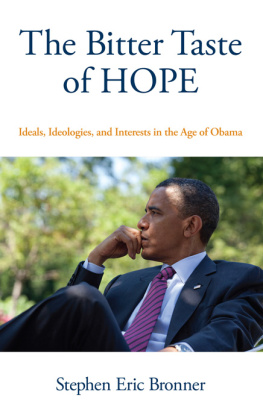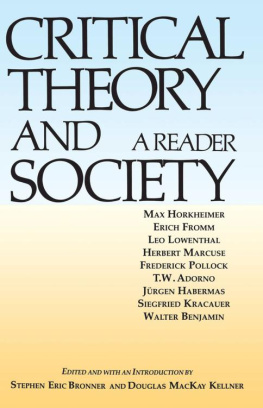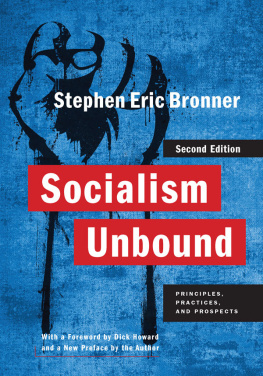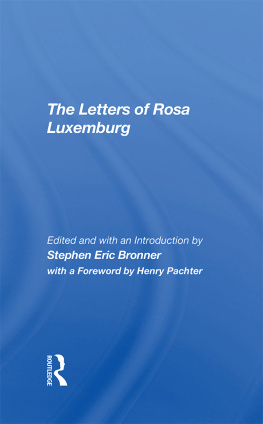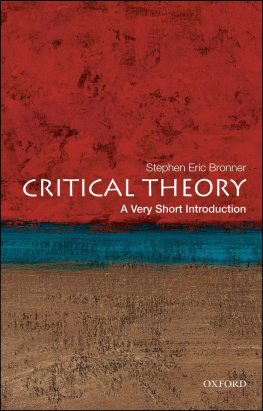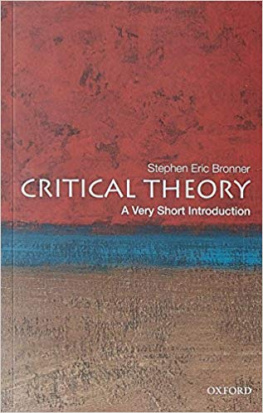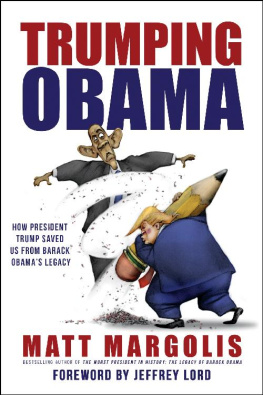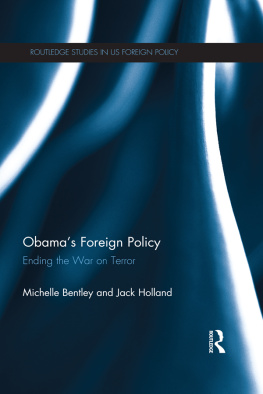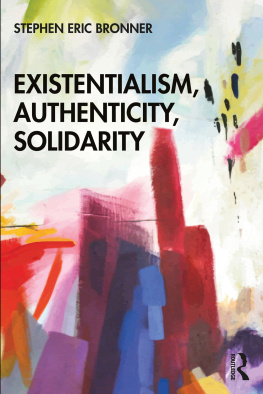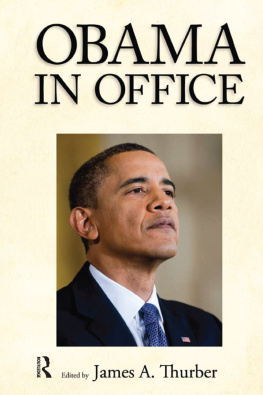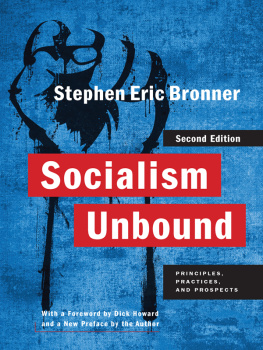The Bitter Taste of Hope
SUNY series in New Political Science
Bradley J. Macdonald, editor
The Bitter Taste of Hope
Ideals, Ideologies, and Interests in the Age of Obama
Stephen Eric Bronner
Published by State University of New York Press, Albany
2017 State University of New York
All rights reserved
Printed in the United States of America
No part of this book may be used or reproduced in any manner whatsoever without written permission. No part of this book may be stored in a retrieval system or transmitted in any form or by any means including electronic, electrostatic, magnetic tape, mechanical, photocopying, recording, or otherwise without the prior permission in writing of the publisher.
For information, contact State University of New York Press, Albany, NY
www.sunypress.edu
Production, Ryan Morris
Marketing, Michael Campochiaro
Library of Congress Cataloging-in-Publication Data
Names: Bronner, Stephen Eric, 1949 author.
Title: The bitter taste of hope : ideals, ideologies, and interests in the age of Obama / Stephen Eric Bonner.
Description: Albany : State University of New York Press, 2017. | Series: SUNY series in new political science | Includes bibliographical references and index.
Identifiers: LCCN 2016031495 (print) | LCCN 2016050551 (ebook) | ISBN 9781438465494 (hardcover : alk. paper) | ISBN 9781438465500 (e-book)
Subjects: LCSH: Obama, Barack. | United StatesPolitics and government2009 | United StatesForeign relations2009 | United StatesForeign relationsMiddle East. | Middle EastForeign relationsUnited States.
Classification: LCC E907.B76 2017 (print) | LCC E907 (ebook) | DDC 973.932092dc23
LC record available at https://lccn.loc.gov/2016031495
10 9 8 7 6 5 4 3 2 1
Rosalyn Baxandall,
feminist, intellectual, activistand comradeContents
Acknowledgments
There are always many people to thank for helping bring a book to fruition. Bradley Macdonald suggested that I put together this volume for the fine series he is editing for SUNY Press, and Manfred Steger was just as enthusiastic about the project. I owe an extraordinary debt to Dr. James Jennings and Cliff Gardner of Conscience International and US Academics for Peace with whom I traveled for various efforts in civic diplomacy to Iran, Iraq, Palestine, Sudan/Darfur, and Syria. Along with friends like Janet Amighi and Lawrence Davidson, they helped expand my world and, through their humanitarian commitments, attempt to turn theory into practice. I also owe a debt to my colleagues, Alex Hinton and Nela Navarro, at the Center for the Study of Genocide and Human Rights at Rutgers University. Lastly, I would like to thank a group of doctoral students who worked with me and who provided excellent comments in a seminar about the manuscript. These fine scholars include: Aaron Kraut, Kelsey Lizotte, Barea Sinno, David Staszheim, Sarah Weirich, and especially my principal research assistant Edwin Daniel Jacob whose support was invaluable. And then, of course, there is my wife Anne Burns, who has always supported my work as she has shared my travels.
Chapter 2 is based on an invited talk for the Swedish Association of Sciences in 2009 and chapter 8 on a lecture for the International Forum on the Holocaust at the Russian State University in Moscow, also in 2015. Chapters 1, 4, 16, 19, 21, 22, and 27 initially appeared whole or in part in Logos: A Journal of Modern Society and Culture, www.logosjournal.com. Chapters 3, 6, 10, 11, 12, 13, 14, 17, 18, 19, 20, 23, 25, and 26 appeared whole or in part in Reader Supported News, www.rsnorg.org. Chapter 5 initially appeared in the Green European Journal, and chapters 7 and 15 in the Heathwood Press, www.heathwoodpress.com. Chapter 24 initially appeared in the Tehran Times.
Introduction
Obamas Legacy
C omposed of popular essays and articles written between 2008 and 2016, which mostly appeared in Internet journals, The Bitter Taste of Hope starts where my previously published books Blood in the Sand and Peace Out of Reach left off. Soaring hopes raised by the presidential victory of Barack Obama soon shared the public sphere with surging racism, gun violence, cultural conflicts, religious extremism, attacks on past reforms, rising intolerance and xenophobia, and manifold fears of democracy and modernity. Some essays in this volume were inspired by impressions of what was transpiring, others by forgotten tragedies, still others by memories, but most of all by the subalterns attempts to (using the famous phrase of C. Wright Mills) translate private troubles into public issues. I visited many of the places that I wrote about in this book, and my work in civic diplomacy was complemented by some degree of involvement in political action here at home. There also is a personal touch to this collection (as there was to the prequels) but, this time, I included a few interviews that highlight the connection between scholarship and practice.
The Bitter Taste of Hope is not about Barack Obama but rather certain ideals and principles, practices and policies, that congealed during the years of his presidency. It investigates not only American involvement in Afghanistan and Iraq, the Israeli-Palestinian conflict and foreign policy toward Iran, but the national hopes of Circassians and the suffering endured by the garbage people of Cairo. The Bitter Taste of Hope also treats the Arab Spring and the ensuing international counter-revolution less in terms particular to the Orient than through their structural dynamics. The Middle East has been deeply impacted by the West and, most particularly, by American actions in the region. Its invasions and failed attempts at nation-building in Afghanistan and Iraq paved the way for civil war in Afghanistan and Iraq, the devolution of Syria, the catastrophic Libyan intervention, and the rise of ISIS. An idealistic belief in its democratic mission, fortified by crude realism predicated on the end justifying the means, also led the United States to ally with the most hated nations in the region (such as Bahrain, Israel, and Saudi Arabia), thereby identifying it with lack of respect for international law, hypocritical policies on human rights, employment of the double standard, and imperialist ambitions.
Old grievances among the exploited and disenfranchised remained unaddressed even while transnational uprisings embracing enlightenment and often utopian ideals battled counter-revolutionary movements inspired by authoritarian and dogmatic religious values. Peaceful protest encountered violent response during the Green Revolution in Iran, the short-lived Egyptian republic, and (of course) Syria. New demands are being placed on American foreign policy even as the dead hand of tradition imperils progress at home and abroad. With that in mind, the structure of this volume is almost self-evident: Ideals and Interests, the opening section, introduces the norms and themes that shaped the Obama years and retain their salience; Murderous Impulses, the second section, speaks to certain human tragedies and (seemingly acceptable) irrational attitudes that attack humanitarian values and progressive politics; Rebellion American Style, meanwhile, illuminates some of the movements and anticipatory themes that inspired American social movements during the Obama presidency; and, finally, War and Peace, the concluding section, offers some insights into American foreign policy of the past and how it might be transvalued for the future.

